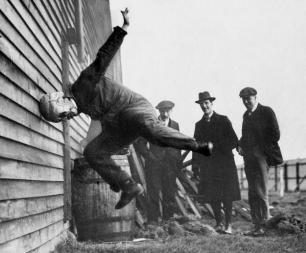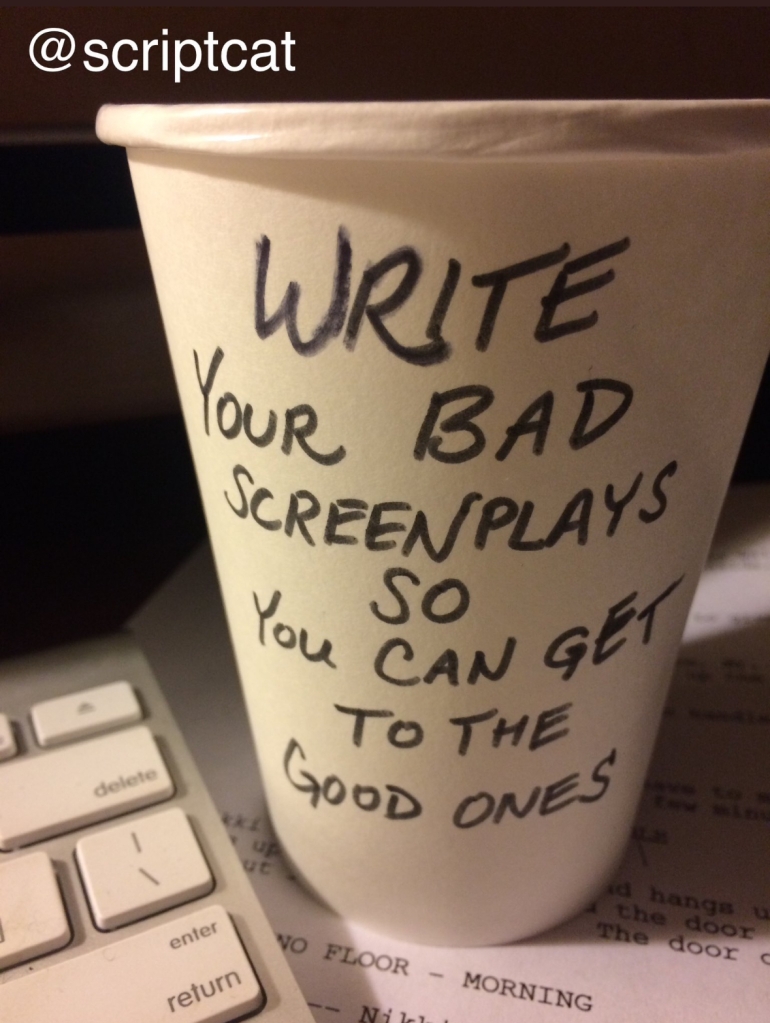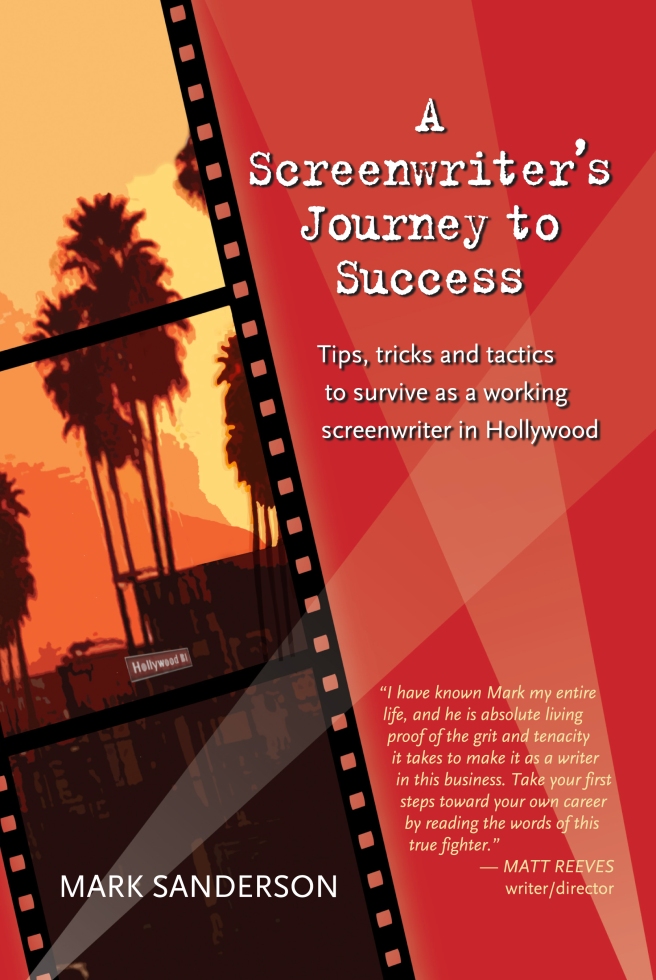My real world advice to beginning screenwriters — do not write stories beyond your ability at this point on your journey. Ease into your epics after you gain more experience with the craft. You should be aware of your screenwriting ability and accept what you can and cannot write at this time. Humility goes a long way on this screenwriting journey. I find that too many beginning writers chase massive budget Hollywood tent-pole story ideas for their first screenplays with the hopes to compete against A-list Hollywood writers. It’s a huge waste of time and energy as the studios already have proven A-listers with box office mega hits and the credits to write the movies that we generally see in the multiplexes. All of the super hero movies are assignment jobs from ideas and franchises the studio already owns. And when 50,000 scripts bounce around Hollywood every year with only under 100 spec sales at the studio level, the odds are horrible for a spec sale.
When writing specs, I try to persuade beginning screenwriters to write something smaller in scope with regards to the story. When beginners work on their first or second screenplays, they are still learning the craft and discovering their own unique style. It takes at least four or five scripts to hit your groove and really understand your strengths and weaknesses as a screenwriter. As you’re becoming a better screenwriter by writing bad specs, making mistakes, and learning how to execute notes, you cannot focus on competing with the A-listers with scripts that are basically learning tools. Early in every screenwriter’s journey is a period where we need the time to explore our identity and ability as screenwriters. We need that precious time to learn our craft. When you begin writing at a professional level, only then will you be able to write something more challenging and stretch your abilities. Patience plus experience equals solid writing.
When starting on your first screenplays, I suggest writing more personal stories. I hate to use this cliché, but focus on character driven stories where you can really showcase your talent for creating relationships between people. Every story that you write should be driven by characters, but some stories end up being more focused on plot. Yes, structure and story are equally important, but if you can’t create memorable, complex, and unique characters that can interact, you will be lost. Showcase your talents with your passion for a story and let it show though on the page. If you’re chasing the big budget tent-pole ideas, you’ll probably be fabricating characters, tropes, and stories that feel inauthentic because they are only a rehash of other movies that you’ve seen.
If you write a story about an F.B.I. agent who deals with a serial killer, did you do research on serial killers or F.B.I. agents, bureau procedures, and how agents think and talk? Did your research include reading books or interviewing an F.B.I. agent? My point about authenticity is that without extensive research or living in the characters minds, the scripts and stories will feel inauthentic because the writer draws experiences only from other movies or TV shows the writer has seen before. This perpetuates clichés and keeps them alive.
I’m talking about spec screenplays and not assignment jobs — a completely different experience. When you work on assignment, you must please producers or executives who must please their bosses at the studio or network, or please the buyer, or the investor, and even the director must please the producer to create a commercial product on schedule and on budget. Always remember, filmmaking is a business first and millions of dollars is on the line with every project.
When writing specs, try to pick stories that can showcase the best of your writing abilities with story structure and equally as important, character development, motivation and emotion. Too many times I read specs that feel inauthentic like they are just rehashing “Hollywood” scenes that the writer only knows from movies and not from real life or experience. Inject your personal life and experiences into your stories to make them unique. If you want to say something or cause people to think, write a personal story and strive to make the emotions leap off the page. This is what will attract talent and move the script forward more than you just trying to roll the dice and hope Hollywood wants another movie about a super hero or giant monster. Again, I’m talking about specs from unknown screenwriters with no credits — and that’s most of the writers trying to break into Hollywood.
You usually get one chance to dazzle them with your script, so you must be writing at a professional level with a solid screenplay to compete. Anything less is a waste of everyone’s time so do not release your screenplay before it’s ready to compete. You also must have the patience to weather the long haul journey while you’re learning your craft and getting muddy as you slog it out in Hollywood’s trenches. This period will be filled with rejection, criticism, and failure, but it’s all part of the process. Patience and humility helps, but if you can’t accept this reality, your frustration and anger will spoil any splendid dreams of a career.
What separates those aspirants who see screenwriting as an easy way to fame and fortune from those writers who have a professional mindset? It’s a respect and humility for the difficulty of writing, the discipline to create the necessary work, and going after dreams even in the face of the incredible odds to reach any level of success. Keep true to yourself and always write with a passion for your work, but when first staring out keep it simple and don’t tackle stories beyond your ability.
Scriptcat out!
Follow me on X: @scriptcat
Also subscribe to my YOUTUBE CHANNEL with over 80 screenwriting videos about the journey.
Did you just complete you latest script or a new draft? Is it time for in-depth professional screenplay consultation for your feature or TV script? Check out my services. Click on the icon below for the link to my website.
Need help navigating Hollywood’s trenches as you pursue your screenwriting career? Consider my book available on Amazon with 56 FIVE STAR reviews! (click on book cover for link to purchase)
It’s a long haul journey to reach any level of screenwriting success. If your passion drives you to embark on this crazy adventure of a screenwriting career, you’ll need to prepare for survival in Hollywood’s trenches. Talent is important, but so is your professionalism and ability to endure criticism, rejection, and failure over the long haul. The odds may be stacked against you, but the way to standout in this very competitive business is to create a solid body of work and build a reputation as a team player and collaborator. The rest is just luck — a prepared screenwriter who meets with an opportunity and delivers the goods. “A Screenwriter’s Journey to Success” (2024 updated edition) will help you prepare for your own journey with the necessary, tips, tricks and tactics that I’ve developed over the past twenty years of working in the film industry. It’s time to start living your dream as a screenwriter in Hollywood.
“It is no small feat to get a movie made, on any subject, on any screen.” — JJ Abrams
Do you have the patience to wait until your mud settles and the water is clear?”― Lao Tzu, Tao Te Ching
“All you need to do is write truly and not care about what the fate of it is.”—Ernest Hemingway
“No person who is enthusiastic about his work has anything to fear from life.”—Samuel Goldwyn
“I don’t think of it as an art. When it works it’s skill & craft and some unconscious ability”—Ernest Lehman
“Then our writers when they have made some money increase their standard of living and they are caught. They have to write to keep up their establishments, their wives, and so on, and they write slop. It is slop not on purpose but because it is hurried. Because they write when there is nothing to say or no water in the well. Because they are ambitious. Then, once they have betrayed themselves, they justify it and you get more slop.”—Ernest Hemingway, Green Hills of Africa, page 23.
“When the last dime is gone, I’ll sit on the curb outside with a pencil and a ten cent notebook and start the whole thing over again.” — Preston Sturges
“Just do the best you can every time. And if you’re going to stay in the movies, and you like movies—and I love them—you’d better love them a lot, because it’s going to take all of your time. If you want to be in the movies, it’s going to break your heart.”—Richard Brooks
“When you start a movie script, it’s like entering a dark room: You may find your way around all right, but you also may fall over a piece of furniture and break your neck. Some of us can see a little better than others in the dark, but there is no guaranteeing the audience’s reaction.”—Billy Wilder




